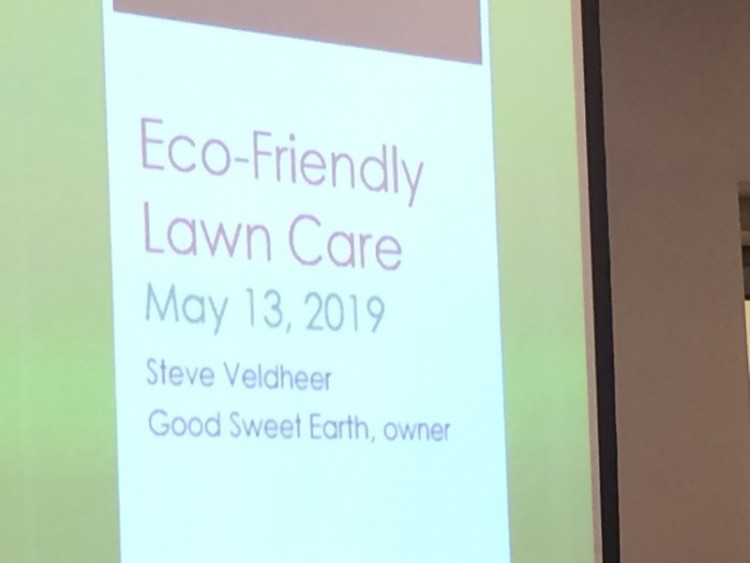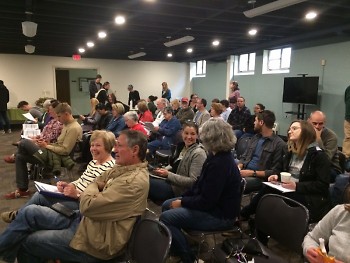Biochar. Milorganite. Ringer Lawn Restore. Grand Rapids yard enthusiasts got an earful about how to green up their yards without using synthetic chemical fertilizers at the second annual Organic Lawn Workshop at Mayfair Church on Monday, May 13.
Growing Green, a grassroots movement of the Sierra Club Greater Grand Rapids, hosted the event, which was facilitated by Steve Veldheer, owner of Good Sweet Earth, an all-organic fertilizer company in Zeeland Township.
Many homeowners rely on synthetic chemical fertilizers, which produce what Veldheer referred to as “a pure monoculture lawn.” But while they can help create beautiful green and weed-free yards, there are pros and cons to this approach.
Veldheer compares chemical fertilizers to junk food.
“They give grass a quick burst of energy,” he said. “But if that’s all you’re feeding your lawns, it’s very unhealthy.”
Also environmentally unhealthy is exposing children and pets to the chemicals in the yards. And these products put salt and petroleum byproducts in our grass as well.
For Veldheer, the most important way to have a healthy lawn is to have healthy soil.
“Soil needs life,” he said. “If it doesn’t get this it becomes sterile and compacted.” If the soil is neglected in favor of chemical fertilizers, the lawn will need more frequent applications.
The life needed for healthy soil comes from diversity—from microbes, worms, and organic matter that is either already in the soil or is added to it through top dressings or soil amendments. These can range from grass clippings and leaves, which Veldheer calls Nature’s free and easy fertilizer, to compost, to alfalfa meal, to Ringer Lawn Restore, which he says is “basically spent distiller’s grains.”
While natural fertilizers like these are harder to find, and sometimes come at a higher cost, benefits are significant:
- Nutrients are released more slowly, requiring fewer applications;
- They contain nutrients beyond the standard chemical nitrogen/phosphorus/potassium mix;
- They put organic material in the soil.
Other natural fertilizers include biochar, which is a product from an ancient process of low-oxygen burning of plant material so that it “smolders down to a charcoal-type substance,” according to Veldheer.
And then there is Milorganite, which is composted human waste that comes from Milwaukee. “The City of Milwaukee,” said Veldheer, “had raw sewage that they didn’t know what to do with, and so they composted it, and it’s pathogen free.” As with cow or other animal manure, the waste can be composted, but it takes a lot of time to get rid of the pathogens.
Veldheer’s own business focusses on vermicomposting which uses worms to break down the organic materials. In this composting process the worms actually digest mold in organic material, and the vermicompost is what is left over.
Veldheer fielded many questions over the course of the 90-minute workshop from the audience of about 50 people, on fertilizing and other lawn care practices like watering, weeding, and mulching.
The Rapidian, a program of the 501(c)3 nonprofit Community Media Center, relies on the community’s support to help cover the cost of training reporters and publishing content.
We need your help.
If each of our readers and content creators who values this community platform help support its creation and maintenance, The Rapidian can continue to educate and facilitate a conversation around issues for years to come.
Please support The Rapidian and make a contribution today.


